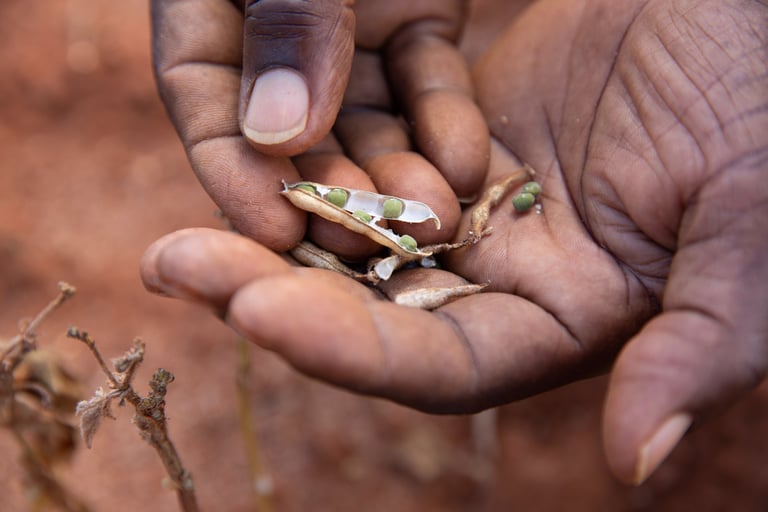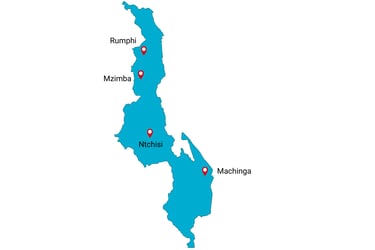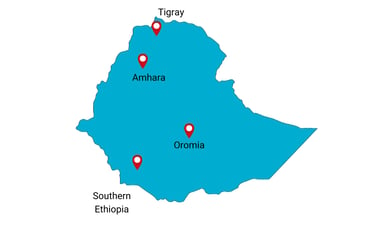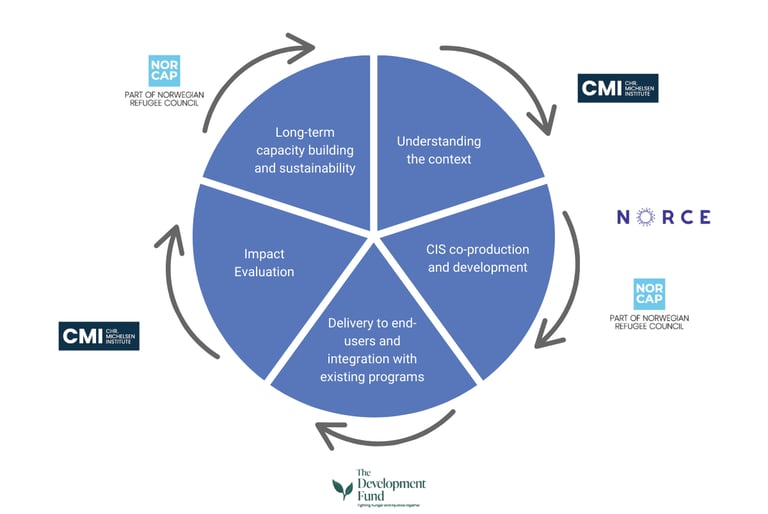Climate Information to Build Resilient Farming Communities


Across the world, smallholder farmers in vulnerable communities are bearing the brunt of climate change. Extreme weather events like droughts, floods, and erratic rainfall during critical agricultural seasons continue to increase. These climate shocks threaten smallholder livelihoods and there is an urgent need to build resilience through Climate Information Services and Climate Smart Agricultural Practices (CSA) practices.
Agricultural Resilience through Climate Services (ARCS) is a consortium project funded by the The Norwegian Agency for Development Cooperation (NORAD), and is being implemented in Malawi and Ethiopia to improve not only smallholder farmers’ resilience but also food security amid climate change. The core objective of ARCS is to improve access to reliable Climate Information Services (CIS) that enable informed agricultural decisions. Specifically, the project will:
Understand local institutional frameworks, decision-making processes, and the needs and capacities for co-producing CIS relevant to smallholders.
Co-produce timely, localized, and sustainable climate forecasts and agricultural advisories.
Establish inclusive, effective, and sustainable CIS delivery mechanisms that integrate into existing structures and provide enabling activities directly to smallholder farmers.
Conduct a rigorous Impact Evaluation through a Randomised Control Trial (RCT) to assess program impact and scalability.
Strengthen institutional capacity and facilitate knowledge-sharing for CIS development and dissemination.
ARCS, led by NORCAP with partners Chr. Michelsen Institute (CMI), NORCE and the Development Fund, offers a model for resilient food systems through a unique consortium approach. ARCS addresses the full climate services value chain - from innovative forecasting to localised advisories and enabling activities.
Where we work
Our project operates in Malawi and Ethiopia, focusing on enhancing smallholder farmers' resilience through tailored climate services and agricultural practices.
Malawi
Accurate and accessible climate data is central to building resilience and protecting livelihoods among smallholder farmers. With a Human Development Index below the Sub/Saharan average and over 80 percent of its population dependent on rainfed agriculture, the impacts of climate change (delayed rains, prolonged dry spells, and widespread crop failure) are pushing millions into food insecurity in Malawi.
To build resilience and protect livelihoods of the most vulnerable communities in Malawi, ARCS operates in four districts: Rumphi, Mzimba, Ntchisi and Machinga.
Ethiopia
Ethiopia is facing profound human development challenges with nearly 80% of rural communities living in poverty and over 10 million people affected by food insecurity. The country is grappling with overlapping crises from conflict and displacement to climate shocks like droughts and floods. These climate shocks threaten Ethiopia’s smallholder farmer livelihoods, underscoring the ARCS project's urgency to build resilience through tailored climate information and climate-smart agricultural (CSA) practices.
In Ethiopia, ARCS operates in Tigray, Amhara, Oromia, and Southern Ethiopia.
ARCS Impact
Research
In August 2024, NORCE and CMI conducted fieldwork in Malawi, engaging over 140 participants through 55 group interviews and meetings with NGOs, government, and universities to understand local institutional and decision-making contexts to produce actionable climate services.
This work in collaboration with Malawi’s Department of Climate Change and Meteorological Services (DCCMS), helped shape a research agenda grounded in local needs. The project focuses on three case studies in Malawi and Ethiopia, exploring: Climate service governance, Community knowledge for adaptation, Household vulnerability and use of climate information. Additionally, a detailed Institutional Mapping Report was produced for Malawi. Research paper titled Seasonal forecasts and rural agriculture in Ethiopia (Time & Society, July 2024) was produced with two additional papers on climate services in East Africa under review.
Needs-based weather information
In partnership with national meteorological services, DCCMS in Malawi and Ethiopian Meteorology Institute (EMI) in Ethiopia, the project is working to improve the relevance and reliability of climate forecasts through co-production with local institutions. In Malawi, 32 in-depth interviews with key stakeholders provided insights into the institutional governance of climate services while the assessments of existing forecast products revealed critical gaps particularly in predicting rainfall onset and dry spells.
A prototype forecast tool is being developed while research is being conducted to examine inconsistencies in rainfall timings and to explore how soil moisture and local knowledge can better inform planting periods. In Ethiopia, the project has identified a link between tropical Atlantic Sea temperatures and reduced March–May rainfall, offering new insights into seasonal predictability in the Intergovernmental Authority on Development (IGAD) region. Together, these efforts are strengthening early warning systems and supporting more climate-resilient decision-making at the local level.
Establishing inclusive, effective, and sustainable delivery mechanisms
Thousands of farmers have received support to boost climate resilience and food security in Ethiopia. The project delivered improved seeds, tools, and irrigation pumps to many households, enabling year-round farming and crop diversification. Water harvesting structures, reforestation efforts, and distribution of farm tools in conflict-affected areas helped restore livelihoods. Women played a key role with a significant number participating in savings groups and income-generating activities like poultry, vegetable farming, and small businesses. Our Climate advisory training reached government experts and extension workers across three regions, laying the groundwork for improved climate services for farmers in 2025. Additionally, a climate agro-advisory Training of Trainers (ToT) was held in Tigray, Amhara, and Oromia and government experts and extension workers completed the three-day training to improve climate advisory services for farmers.
In Malawi, seasonal rainfall forecasts for 2024–2025 reached local communities via national and district-level forums. ARCS enabled extension officers to participate in forecast dissemination across four districts and trained Agricultural Extension Development Officers in delivering climate information to farmers. The training equipped officers with tools to translate forecasts into practical advice. The module was developed with technical input from the Malawi University of Science and Technology.
Assessing impact among end-users
CMI is working to understand how certain programs are helping farmers in Ethiopia and Malawi. To do this, they’ve teamed up with local experts and researchers to gather information directly from communities. They’ve carefully chosen villages and households to take part in surveys, making sure the setup is fair and the results will be meaningful. The goal is to see what kind of difference these programs are making in people’s lives. Along the way, they’ve also shared ideas and learned from other projects to improve how they work. Additionally, CMI has also contributed to cross-project learning by participating in the Norad-NORCAP Annual Technical Workshop in Kenya, strengthening synergies across climate service initiatives.
Long-term institutional capacity-building, learning, and sustainability (NORCAP)
As part of its sustainability efforts, NORCAP is supporting long-term capacity building in Malawi by deploying climate communication experts to the national meteorological service. This expert led foundational training for staff, helping improve how weather and climate information is shared with the public. Through engaging content like podcasts and documentaries in local languages, communities gained better access to climate updates via radio and mobile platforms.
The initiative also strengthened connections between national, district, and community-level stakeholders, ensuring that climate services are more responsive to local needs. By creating feedback loops and using inclusive communication methods, the project is laying the groundwork for a scalable model that makes climate information more accessible, relevant, and actionable for end-users across Malawi.





